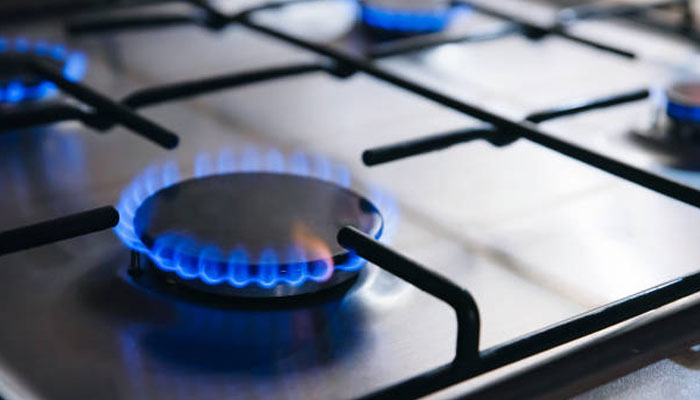Domestic users to get gas only during cooking hours in winter
LAHORE: In a caution about low energy supplies during the upcoming winter months, consumers have been forewarned that natural gas will be provided only during cooking hours.
Impressing upon consumers regarding wise use of gas in the coming months, Sui Northern Gas Pipelines Limited (SNGPL) said the gap between demand and supply of gas increases more than three times during winter. Consequently, the difference can be as high as 500mmcfd [million cubic feet per day] for domestic consumers in the whole network of gas utility during the severe winter months.
Hence, gas will only be provided during cooking hours in winter to domestic consumers, who have been assigned top priority in merit order, said a spokesperson for the SNGPL here Monday.
The gas utility asked consumers to use gas wisely; they should use electric heaters instead of traditional unhealthy gas heaters and use solar or instant geysers on priority basis, instead of traditional gas geysers.
Due to increasing gas demand, the government is ensuring import of liquefied natural gas (LNG). About availability of gas for other consumer categories, the spokesperson said that despite all efforts, the industrial sector might also face load management.
To a question, an official of gas utility said gas supply to certain areas in winter may completely be cut for a few hours in order to avoid collapse of distribution network. There is no assurance of non-stop and normal gas supplies to even high-priced bulk domestic consumers of regasified LNG and industry, said the official. The SNGPL is not bound to provide gas to industry during winter months, as the supply agreements have been for nine months only.
The gas utility has been under immense pressure for meeting gas demand even after import of LNG. In such efforts, SNGPL has to face severe financial crunch in the form of circular debt, which now hovers around Rs71 billion. The piling up of gas sector circular debt has become a complicated issue, as no one in the government takes responsibility in this regard. Gas utility in the past had been asked to divert RLNG in order to ensure sustained supplies. But now no one is ready to bear the financial cost of diverting RLNG to domestic consumers.
-
 Hilary Duff Opens Up About Marriage Fears Despite Strong Bond With Matthew Koma
Hilary Duff Opens Up About Marriage Fears Despite Strong Bond With Matthew Koma -
 ‘Grey’s Anatomy’ Star Eric Dane Breathes His Last At 53
‘Grey’s Anatomy’ Star Eric Dane Breathes His Last At 53 -
 Donald Trump Breaks Silence On Andrew’s Arrest: ‘It’s A Shame’
Donald Trump Breaks Silence On Andrew’s Arrest: ‘It’s A Shame’ -
 DJ Khaled Shares Weight Loss Progress
DJ Khaled Shares Weight Loss Progress -
 Jennifer Aniston And Jim Curtis Share How They Handle Relationship Conflicts
Jennifer Aniston And Jim Curtis Share How They Handle Relationship Conflicts -
 Shamed Andrew Real Birthday Plans As Cops Showed Up At Door
Shamed Andrew Real Birthday Plans As Cops Showed Up At Door -
 Pete Davidson’s Girlfriend Elsie Hewitt Says 'everything Hurts' After Sudden Medical Emergency
Pete Davidson’s Girlfriend Elsie Hewitt Says 'everything Hurts' After Sudden Medical Emergency -
 Princess Beatrice 17 Holidays Per Year Exposed Amid Andrew Arrest
Princess Beatrice 17 Holidays Per Year Exposed Amid Andrew Arrest -
 Who Is 'Queen Of Woke'? UK First Female Civil Head
Who Is 'Queen Of Woke'? UK First Female Civil Head -
 Dwayne Johnson Confesses What Secretly Scares Him More Than Fame
Dwayne Johnson Confesses What Secretly Scares Him More Than Fame -
 Elizabeth Hurley's Son Damian Breaks Silence On Mom’s Romance With Billy Ray Cyrus
Elizabeth Hurley's Son Damian Breaks Silence On Mom’s Romance With Billy Ray Cyrus -
 Shamed Andrew Should Be Happy ‘he Is Only In For Sharing Information’
Shamed Andrew Should Be Happy ‘he Is Only In For Sharing Information’ -
 Daniel Radcliffe Wants Son To See Him As Just Dad, Not Harry Potter
Daniel Radcliffe Wants Son To See Him As Just Dad, Not Harry Potter -
 Apple Sued Over 'child Sexual Abuse' Material Stored Or Shared On ICloud
Apple Sued Over 'child Sexual Abuse' Material Stored Or Shared On ICloud -
 Nancy Guthrie Kidnapped With 'blessings' Of Drug Cartels
Nancy Guthrie Kidnapped With 'blessings' Of Drug Cartels -
 Hailey Bieber Reveals Justin Bieber's Hit Song Baby Jack Is Already Singing
Hailey Bieber Reveals Justin Bieber's Hit Song Baby Jack Is Already Singing




